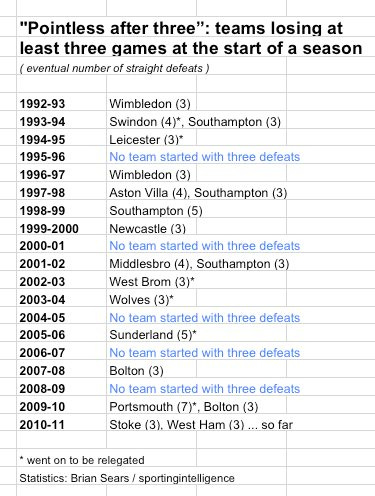West Ham and Stoke: pointless but not hopeless
By Brian Sears 8 September 2010 West Ham currently prop up the Premier League table, pointless after three games and with a goal difference of minus eight after defeats to Aston Villa, Bolton and Manchester United. Stoke are one place above them, also pointless, and with a goal difference of minus four, after successive defeats to Wolves, Tottenham and Chelsea. The statistical relevance in this pair of pointless clubs and their hat-trick of losses is, admittedly, quirky, not to say esoteric. But it must be said: in this 19th Premier League season, there have now been 19 clubs - including the Hammers and Stoke - who have started Premier League seasons with three straight defeats. Our table below provides the season-by-season detail. But West Ham and Stoke should not panic, yet. Only six of their 17 predecessors have gone on from a pointless start after three games to be relegated. This season's pointless duo should take heart especially from Southampton who escaped relegation in each of the four seasons that they began a Premier League campaign with at least three defeats. In 1993-94, 1997-98 and 2001-02, the Saints lost three on the bounce (or perhaps it would be more accurate to say three in the slump) at the start of the season, while in 1998-99 they lost five. And every season they survived. When they were relegated, at the end of the 2004-05 season, it was after 38 League matches that had begun with an away defeat at Aston Villa then a 3-2 home win over Blackburn. The longest run of straight defeats at the start of a Premier League season was recorded last season, by Portsmouth, who opened with seven losses. They didn’t get a point until early October. . More Brian Sears Sportingintelligence home page .
* * * * * * * * * * * * * * * * * * * * * * * * * * * * * * * * * * * * * * * * * * * * * * * * * * * * * * * * * * * *
Do you watch Premier League football anywhere outside England? Join our unique research project
* * * * * * * * * * * * * * * * * * * * * * * * * * * * * * * * * * * * * * * * * * * * * * * * * * * * * * * * * * * *




